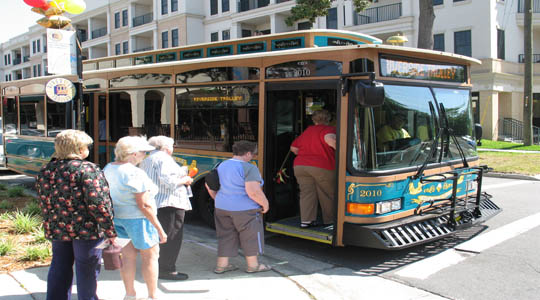Stakeholders seek longterm solutions for Riverside-Avondale parking woes
Posted on May 30, 2012 By Editor Articles, Neighborhood News, Top Stories

By Steve DiMattia
There is no shortage of vision for Riverside/Avondale’s parking solutions. But making that vision a reality is the challenge.
“There are a lot of short term options being discussed to address parking issues, but we are trying to develop more permanent solutions for the entire historic district,” said Jim Love, Riverside/Avondale District 14 Councilman. “Money is a big hurdle, safety is always a concern and we are also in need of reliable data to help us move in the right direction.”
In that vain, Love recently met with Calvin Burney, the city’s planning and development director, about developing an overall transportation and parking plan. The councilman proposed in a letter to Burney dated May 17 a “temporary moratorium” on any new commercial development in the Avondale and King Street corridors. During that time, a study will be conducted “to identify the best ways to address and mitigate the issues related to public safety, parking, traffic and the appropriate scale and mix of commercial development,” according to the letter.
If local developers, business owners, politicians, residents and preservationists can agree on the expression of their vision – and find the necessary funds – that plan would be all encompassing and parking would be a seamless part of the overall flow of each pedestrian-friendly commercial area: that might include include dedicated sidewalks and bike paths leading to the commercial corridors, reliable, inexpensive mass transit including shuttles, trolleys and street cars, extensive use of shared parking and creative alternatives such as pedicabs and bike rentals.
This vision, however, is far from being realized. With the yearlong battle over Riverside’s Goozlepipe & Guttyworks only recently resolved and community debate over Mellow Mushroom’s proposed Avondale location on the horizon — viable parking solutions are still very much a dream.
In the meantime, the conversation is moving forward in a variety of venues.
An April community meeting over the proposed Mellow Mushroom attracted nearly 300 citizens and opened a lively debate about the size of the 250-seat restaurant and the potential of some of the proposed parking solutions.
“We called this meeting to open a dialogue with the community,” said Steve Diebenow, an attorney representing Mellow Mushroom and a local resident. “It’s a bigger issue beyond Mellow Mushroom; it’s a balance between commerce and residential. We are trying to deal with the larger issue by coming up with comprehensive solutions for parking.”
Toward that end, Diebenow said that Mellow Mushroom would be willing to help fund a transportation/parking study and noted that the restaurant’s plans include 60 bicycle racks.
Riverside Avondale Preservation has already taken a step toward collecting data. Its transportation committee, chaired by Kay Ehas, conducted a count comparing restaurant seats-to-parking space-availability and found 185 spaces serving 1,085 seats in Avondale and 211 spaces for 1,908 seats along King Street.
“RAP would like to see the development of long term transportation goals that are vetted with the community and put into an enforceable policy document,” said Ehas, echoing Love’s goal of a comprehensive plan. “We need a paradigm shift: Instead of building beyond the scale of the neighborhood and making accommodations for cars, we need to keep within the current footprint and accommodate pedestrians, bicyclists and mass transit. Cars should come last.”
That was also the sentiment relayed by a panel of local experts who recently joined WJCT Public Broadcasting’s Melissa Ross on First Coast Forum. The panel included Doug Skiles from In Town Neighbors for Better Transit, a group made up of representatives from San Marco, Riverside/Avondale and Springfield who are seeking inventive ways to connect those neighborhoods.
“We look at the micro, the neighborhood level,” Skiles said. “This includes developing fixed transit systems that can serve specific areas.”
Skiles noted that the city council has passed a Mobility Plan that has dedicated funds for streetcars, but then put a moratorium on it after the economy began to falter so is currently not collecting fees on it.
While money will always be an issue moving forward, Diebenow said all stakeholders should have a say in any plan.
“People are passionate about the neighborhood and they should be,” Diebenow said. “The important things are that there remain open lines of communication and that the long term solutions encompass everyone’s needs.”




 (1 votes, average: 5.00 out of 5)
(1 votes, average: 5.00 out of 5)




